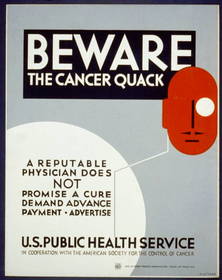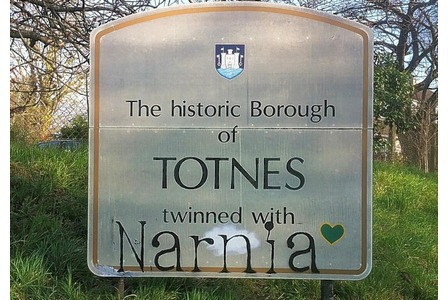
By Guy Chapman
Healthcare in the UK is structured fundamentally differently from that in the US. In fact this is true of most of Europe, where state funded healthcare is the norm and copayments are typically small or non-existent. One of the more visible differences is that doctors typically do not advertise at all, and drug companies are not allowed, by law, to advertise prescription drugs to the general public.
With real healthcare essentially free at the point of delivery - and at a very high standard - you’d be forgiven for thinking that quackery would not get a look-in. If only this were so. The country is awash with homeopaths, naturopaths, reiki “healers”, chiropractors and the like. And yes, cancer quackery too.
And that’s where it gets interesting.
Healthcare in the UK is structured fundamentally differently from that in the US. In fact this is true of most of Europe, where state funded healthcare is the norm and copayments are typically small or non-existent. One of the more visible differences is that doctors typically do not advertise at all, and drug companies are not allowed, by law, to advertise prescription drugs to the general public.
With real healthcare essentially free at the point of delivery - and at a very high standard - you’d be forgiven for thinking that quackery would not get a look-in. If only this were so. The country is awash with homeopaths, naturopaths, reiki “healers”, chiropractors and the like. And yes, cancer quackery too.
And that’s where it gets interesting.
The Cancer Act of 1939 was a law enacted primarily to establish the National Radium Trust, a body constituted to support the supply of therapeutic agents to cancer patients, and to regularize the field of cancer treatment. Over the years its functions have been subsumed into other Acts and repealed, to the point that only one provision remains:
4. Prohibition of certain advertisements.
(1) No person shall take any part in the publication of any advertisement--
(a) containing an offer to treat any person for cancer, or to prescribe any remedy therefor, or to give any advice in connection with the treatment thereof;
Yes, you read that right. It is illegal, in the UK, to advertise cancer treatments, quack or otherwise. This isn’t a problem for the medical community, who you’ll remember generally don’t advertise anyway, but you can see how it could be a problem for quacks. Prosecutions have, however, been rare, not least, it seems. because few people even knew it existed.
Although such advertisements would also be covered under the Consumer Protection from Unfair Trading Regulations (CPRs), establishing an unfair or deceptive practice requires expert evidence, which is expensive. The Cancer Act has a simple, bright-line rule which is relatively easy to prove. The Act and the CPRs are both enforced by the Trading Standards (TS) office of the town in which the advertiser is based.
TS departments are always short staffed and squeezed for funding. Anything requiring expert testimony is a hard sell as a complainant, but 2014 seems to have been a tipping point, when TS officers realized that they could actually USE the Cancer Act.
Prosecutions
There were at least three successful prosecutions in 2014, one in Essex and two in the City of Westminster. The three traders are:
One of the three, Errol Denton, is a bizarre figure. He fell foul of the Advertising Standards Authority (ASA) several times and mounted a sustained campaign against bloggers he held responsible for his ills (because, of course, he sincerely believes the nonsense he peddles). Three of us suffered vexatious complaints of racial harassment to Police and employers, but in every case requests for actual facts to back up the accusations elicited no response. In court he represented himself and relied on a “freeman-on-the land” (FOTL or Footle) defense. This failed rather badly and Denton was probably lucky to escape jail for contempt of court as this has been classed as a form of vexatious litigation, the “organised pseudolegal commercial argument” or OPCA. On appeal Denton hired a barrister but sacked him midway. His conviction was upheld. This made him the top item on the early evening news that day, much to the amusement of those of us he had attacked.
Deterrent effect
In some cases the threat of the Cancer Act has been sufficient to deter questionable activities. The “Houston Cancer Quack” Stanislaw Burzynski was due to visit the UK in 2012 to peddle his unproven remedies and dodgy “clinical trials”, but threats of the Cancer Act from the local TS for Totnes in Devon, caused the event to effectively go underground and Burzynski did not attend. There are other examples including, in 2014, Oasis of Hope UK, who were instructed to remove all cancer claims from their website.
Although such advertisements would also be covered under the Consumer Protection from Unfair Trading Regulations (CPRs), establishing an unfair or deceptive practice requires expert evidence, which is expensive. The Cancer Act has a simple, bright-line rule which is relatively easy to prove. The Act and the CPRs are both enforced by the Trading Standards (TS) office of the town in which the advertiser is based.
TS departments are always short staffed and squeezed for funding. Anything requiring expert testimony is a hard sell as a complainant, but 2014 seems to have been a tipping point, when TS officers realized that they could actually USE the Cancer Act.
Prosecutions
There were at least three successful prosecutions in 2014, one in Essex and two in the City of Westminster. The three traders are:
- Steven Cook, a promoter of colloidal silver as a cure-all;
- Stephen Ferguson, a practitioner of live blood analysis who learned at the feet of Not-A-Doctor Robert O. Young, a quack promoted on Oprah who is currently defending his second prosecution for practicing medicine without a license;
- Errol Denton, another of Young’s acolytes, convicted on nine counts under the Act.
One of the three, Errol Denton, is a bizarre figure. He fell foul of the Advertising Standards Authority (ASA) several times and mounted a sustained campaign against bloggers he held responsible for his ills (because, of course, he sincerely believes the nonsense he peddles). Three of us suffered vexatious complaints of racial harassment to Police and employers, but in every case requests for actual facts to back up the accusations elicited no response. In court he represented himself and relied on a “freeman-on-the land” (FOTL or Footle) defense. This failed rather badly and Denton was probably lucky to escape jail for contempt of court as this has been classed as a form of vexatious litigation, the “organised pseudolegal commercial argument” or OPCA. On appeal Denton hired a barrister but sacked him midway. His conviction was upheld. This made him the top item on the early evening news that day, much to the amusement of those of us he had attacked.
Deterrent effect
In some cases the threat of the Cancer Act has been sufficient to deter questionable activities. The “Houston Cancer Quack” Stanislaw Burzynski was due to visit the UK in 2012 to peddle his unproven remedies and dodgy “clinical trials”, but threats of the Cancer Act from the local TS for Totnes in Devon, caused the event to effectively go underground and Burzynski did not attend. There are other examples including, in 2014, Oasis of Hope UK, who were instructed to remove all cancer claims from their website.
| Totnes, home of the cancer conference mentioned above, is the UK’s epicentre of new age claptrap. TQ9ers (so-called because of their postal code, which starts TQ9) are basically flower children. Wags (presumably drawn to Totnes by the flow of earth energy along the ley lines) deface the sign as fast as the council can repair it: it’s now apparently twinned with Area 51, Nevada not Narnia. |
Looking ahead
This is the age of the Internet. Regulating UK-based advertisers is all well and good, but nonsense flows across borders. There is a steady stream of appeals for money to travel to Oasis of HypeHope, the Burzynski clinic and other unsavory institutions. Some of the patients featured in Burzynski propaganda are British. One of them died in 2014 from her disease. Genesis II Church, which promotes bleach as a cure for everything including cancer, has held seminars in London
Of greater concern, however, is that Lord Saatchi is pressing a medical innovation bill which would protect maverick doctors from the legal consequences of capricious treatment choices. This is opposed by pretty much every medical body including the Medical Defence Union, which defends doctors accused of malpractice, and several medical research bodies including the Wellcome Foundation. It’s a terrible Bill even after great swathes of it were revised in response to criticism, and it “fixes” a problem that basically doesn’t exist . It’s ironic that just as the medically unqualified quacks are being reined in, there is a serious attempt to enable real doctors to abandon the evidence-based approach when the whim takes them.
Even the Cancer Act is unevenly applied due to the fragmented nature of TS. CANCERactive, a “charity” that exists to promote questionable cancer information, escaped prosecution in no small part because TS could not really pin down who was responsible for enforcement; the Charity Commissioners seem disinclined to act, so they continue to peddle nonsense.
Happily, 2014 also saw the ASA negotiating collaborative working with TS as a backstop for adjudicated complaints which are simply ignored. This may result in more use of the CPRs, which would have a much wider impact than just cancer quackery, but at this stage we don’t really know how it will pan out - not least because ASA are in the process of consulting on their priorities. The Cancer Act has been applied because it is simple and unambiguous.
Summary
The Cancer Act is a useful tool for addressing one specific subset of cases, but the regulatory landscape in other areas is much more favorable for quacks. Trading Standards are struggling to come to terms with the promotion of quackery, but advertising - online and in print - is being actively addressed by the Advertising Standards Authority - who stand pretty much alone in tackling the promotion of all other forms of quackery in the UK.
Useful resources
This is the age of the Internet. Regulating UK-based advertisers is all well and good, but nonsense flows across borders. There is a steady stream of appeals for money to travel to Oasis of HypeHope, the Burzynski clinic and other unsavory institutions. Some of the patients featured in Burzynski propaganda are British. One of them died in 2014 from her disease. Genesis II Church, which promotes bleach as a cure for everything including cancer, has held seminars in London
Of greater concern, however, is that Lord Saatchi is pressing a medical innovation bill which would protect maverick doctors from the legal consequences of capricious treatment choices. This is opposed by pretty much every medical body including the Medical Defence Union, which defends doctors accused of malpractice, and several medical research bodies including the Wellcome Foundation. It’s a terrible Bill even after great swathes of it were revised in response to criticism, and it “fixes” a problem that basically doesn’t exist . It’s ironic that just as the medically unqualified quacks are being reined in, there is a serious attempt to enable real doctors to abandon the evidence-based approach when the whim takes them.
Even the Cancer Act is unevenly applied due to the fragmented nature of TS. CANCERactive, a “charity” that exists to promote questionable cancer information, escaped prosecution in no small part because TS could not really pin down who was responsible for enforcement; the Charity Commissioners seem disinclined to act, so they continue to peddle nonsense.
Happily, 2014 also saw the ASA negotiating collaborative working with TS as a backstop for adjudicated complaints which are simply ignored. This may result in more use of the CPRs, which would have a much wider impact than just cancer quackery, but at this stage we don’t really know how it will pan out - not least because ASA are in the process of consulting on their priorities. The Cancer Act has been applied because it is simple and unambiguous.
Summary
The Cancer Act is a useful tool for addressing one specific subset of cases, but the regulatory landscape in other areas is much more favorable for quacks. Trading Standards are struggling to come to terms with the promotion of quackery, but advertising - online and in print - is being actively addressed by the Advertising Standards Authority - who stand pretty much alone in tackling the promotion of all other forms of quackery in the UK.
Useful resources
- Trading Standards Central to find the correct Trading Standards office for a specific complaint.
- Advertising Standards Authority for complaints about misleading advertisement form UK-based companies. You don’t have to be located in the UK, Stephen Barrett of QuackWatch has logged several successful complaints.
- Sense About Science has a brilliant “ask for evidence” resource if you’re not sure about an advertising claim.
Guy Chapman is a British skeptical blogger, nerd, amateur baritone and Wikipedia administrator. According to homeopaths he is a pharma shill, a teenager with an IQ of under 80 and lives with his mother. Bless them. You can follow him @Sceptiguy - and do check out his Quackford English Ducktionary.


